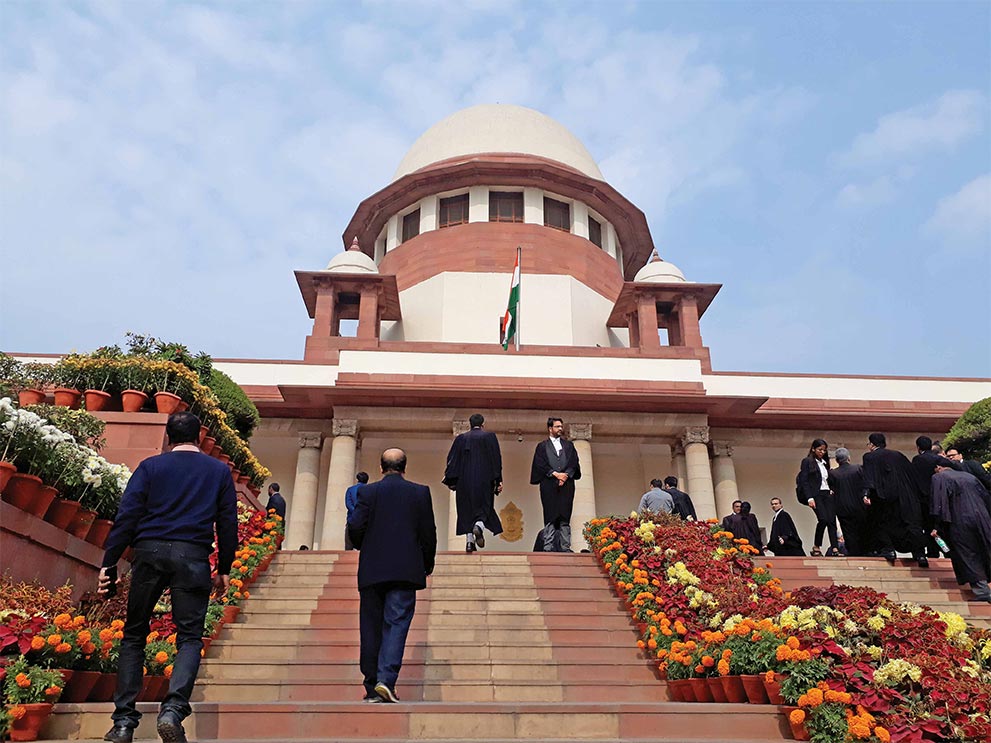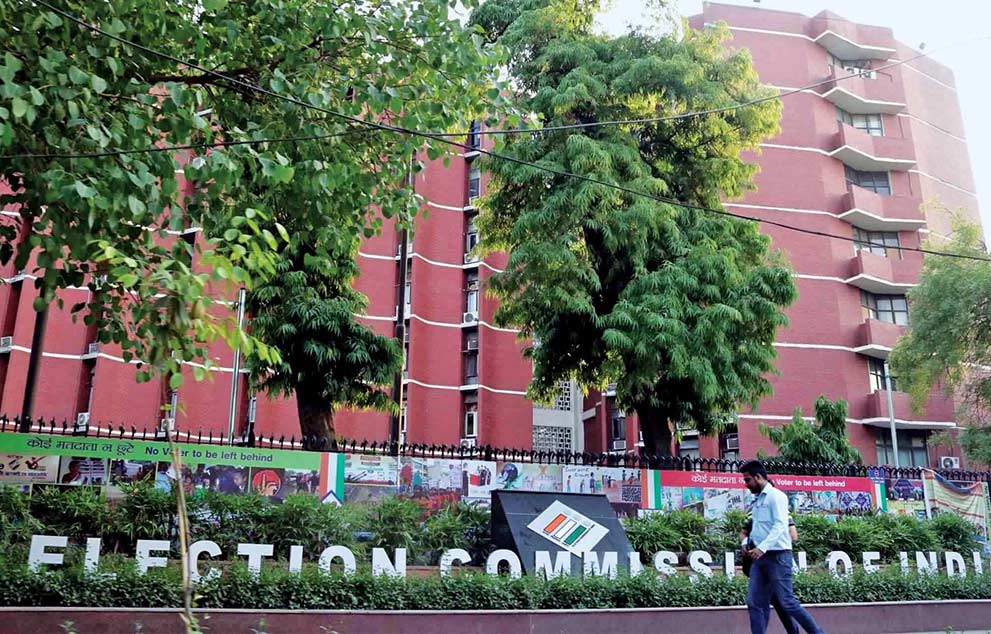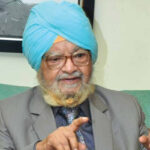RECLAIM the Republic”, these are the words resonating these days in the intellectual circles and is trickling down to the grassroots as a cry for saving India’s First Republic. Reclaiming the Republic means saving its institutions because Republics do not comprise of individuals but institutions. There are several of them that have been built into the Constitution as well as structured from outside. These include office of the President of India, the Council of Ministers, Parliament, CAG, UPSC, Minority Commission and the Election Commission.
In actual practice, the office of President has become functus officio. ‘Council of Ministers’ function without a mind of its own; Parliament has virtually turned into a trading house; Higher judiciary is reportedly constipated; Minority Commission is invisible; UPSC is becoming increasingly irrelevant; CAG and Election Commission have become their master’s voice and are on the verge of losing their credibility. But the prime institution among all these is the House of the People known as Lok Sabha and among all the above institutions this is the only one directly elected by ‘We, The People!’
Constitutionally mandated IAS has turned into subservient adhocracy and IPS is fast becoming an autocratic tool. CBI has reportedly become a ‘caged dog’; Human Rights and Information Commissions are dump-yards for sinecure-seekers; National Green Tribunals are being gradually extinguished; Reserve Bank of India is becoming a rubber-stamp; Universities have become the abode of fundamentalists; Bank’s Boards are filled with agenda-men. What is worse, Armed Forces of the Union is increasingly becoming political-fodder and tool for ruthless rent-seeking. No wonder the Republic of India is on the verge of collapse and needs to be urgently reclaimed.
To reclaim the Republic, we have to restore its institutions. But how? Let us start from the one institution that has the power as well as the supreme duty to accomplish this—the Parliament. ‘We, the People’ may be the keepers of the constitution. But it is our elected representatives, whom we have placed on the Raisina Hill with all power, perks and authority who actually have to carry out this task. For this India’s Parliament wields massive powers covering all conceivable areas of governance—Legislative, Executive, Financial, Constituent, Judicial, Elec-toral and others.
Legislative Powers: All the subjects in our constitution are divided among state, union and concurrent lists. In the concurrent list, parliamentary law is overriding than state legislative law. Constitution also has powers to make law with respect to state legislatures.
Executive Powers: Under the parliamentary form of government, executive is responsible to Parliament for its acts and policies. Hence Parliament exercises control by various measures like committees, question hour, zero hour, etc. Ministers are collectively responsible to Parliament. In India, political executive is a part of Parliament that exerts control over the executive through procedural devices such as question hour, zero hour, calling attention motion, adjournment motion, half-an-hour discussion, etc. Members of different political parties are elected/ nominated to the parliamentary committees. Through these committees, Parliament controls the government. Committee on ministerial assurances constituted by Parliament seeks to ensure that the assurances made by the ministries to Parliament are fulfilled.
Financial Powers: It includes enactment of budget, scrutinising the performance of government with respect of financial spending through financial committees (post-budgetary control). Parliament enjoys the supreme authority in financial matters. Executive cannot spend any money without Parliament’s approval. No tax can be imposed without the authority of law. The government places the budget before Parliament for approval. The passage of the budget means that Parliament has legalised the receipts and expenditure of the government. The public accounts committee and the Estimates committee keep a watch on the spending of the government. These committees scrutinize the account and bring out the cases of irregular, unauthorised or improper usage in public expenditure. In this way, Parliament exerts budgetary as well as post-budgetary control on the government.
Judicial Powers and Functions include power to impeach the President, the Vice-President, the judges of the Supreme Court and the High Court. Parliament can also punish its members or outsiders for the breach of privilege or its contempt.
Members of Parliament participate in the election of the President and Vice-President. Elections to state legislatures and the Lok Sabha are conducted through laws enacted by Parliament.
Constituent power of Parliament pertains to amendment of the Constitution. Other powers include discussing various issues of national and international importance; imposing emergency; increasing or decreasing area, change names and alter the boundary of the states. And also, to create or abolish state legislature. Any powers can be added from time to time.
PARLIAMENT may make laws for the whole or any part of the territory of India. Seventh Schedule of the Constitution distributes the legislative powers between the centre and the state by putting subjects into Union List, State List and Concurrent List. The centre can make law on any of the subjects in the union list or in the concurrent list. Parliament can override the law of a state on a subject listed in concurrent list. In addition to these powers, the residuary powers are also vested with Parliament.
‘We, The People’ have vested so much of power and authority with Parliament in order to uphold for us and on our behalf Justice, social, economic and political; Liberty of thought, expression, belief, faith and worship; Equity of status and of opportunity and to promote among them all Fraternity assuring the dignity of the individual and the unity and integrity of the Nation. Today, these core values stand severely diminished and damaged.
Justice has been given the prime space because this is the very foundation of any civilised society and the universal dictum is: “No Justice, No Peace”. Despite this, rendering justice has been the most neglected aspect of governance. In fact, justice has become inaccessible, distant, costly and purchasable. Our justice system is based on evidences particularly through affidavits and witnesses as it should be. However, large-scale perjury, fabricated evidence, tampering of records including forensic tests has become the order of the day. Intimidated witnesses are given no protection.
The functioning of police in registering cases, investigation, recording of evidence and pursuing prosecution is far from satisfactory and in fact reek with corruption. Registering of FIRs by common people has become a herculean task. Crime has become a source of business for the police and FIRs have virtually become ‘business tools’ for extortion especially in heinous and lucrative cases. Enacting harsher laws and prescribing draconian punishments would further increase corruption because the golden rule of bureaucracy is: “Stricter the law, higher the bribe.” We are in a situation where law and justice have been hijacked by the criminals and the corrupt with honest and law-abiding citizens left in deep distress.

Liberty and freedom have been ravaged with a spate of harsh, autocratic preventive detention laws and gross abuse of the IPC provisions of sedition and ‘waging war against the state’ as well as state surveillance under the IT Act. Youth and students are being charged with sedition just for voicing their dissent against state terror. Down south, in Thoothukudi, people were shot like dogs and 13 of them killed for protesting against a highly polluting and life-threatening Sterlite copper smelter plant owned by a corporate tycoon close to the powers-that-be in Delhi. Activist Mugilan who exposed the police-plot behind this mass-murder has vanished without trace. Up north in Uttar Pradesh encounter killing has become a state policy and hate-crimes have become the order of the day.
While looters, plunderers and rapists of Mother Earth’s precious gifts of land, water, forests and minerals roam around free, enjoying all power, perks and protection ordinary citizens fighting for their survival and protesting against injustice are being hounded and hunted with draconian laws and barbaric ruthlessness by the minions of the state. While states pursue autocratic laws with extreme vigour, National and State Human Rights Commissions have been rendered impotent, putting human life and security in peril. Yet, we call ourselves a free nation and world’s largest democracy! What a travesty?
‘We, the People’ may be the keepers of the constitution. But it is our elected representatives, whom we have placed on the Raisina Hill with all power, perks and authority who actually have to carry out this task. For this India’s Parliament wields massive powers covering all conceivable areas of governance—Legislative, Executive, Financial, Constituent, Judicial, Electoral and others
Equity is evaporating and livelihood of the poor, small artisans, small farmers, small entrepreneurs and small traders are seriously threatened by the anti-people policies and practices pursued by governments to promote MNCs and big business interests in the name of ‘development’. Selling/mortgaging country’s assets in the garb of ‘reforms’, has led to the subversion of democracy and privatization of government. India is going through the cruel spectacle of a ‘development’ model wherein 52 per cent of the wealth will go to the super rich, 1 per cent, 25 per cent to the rich, 10 per cent, 18 per cent to the middle, 29 per cent and 5 per cent to the poor 60 per cent.
THIS predatory economic model focusing myopically on ‘FDI and GDP’ has transformed value into disvalue, labour into non-labour and knowledge into non-knowledge. This model, shaped by MNCs and capitalist carpetbaggers is based on the commodification and marketisation of everything. Economic systems influence culture and social values. Market economics of commodification creates a commercial culture, where everything has a price, and nothing has value including the virginity and dignity of women. And hence, the gruesome exploitation of the poor and the tribals and the string of heinous crimes against women.
Communities across the country are struggling and people’s fight against such venality is raging. These struggles are mostly land-based and farmers, adivasis, dalits, urban poor and working class have sacrificed their life on the altar of ‘destructive development’, while trying to defend the piece of mother earth to which they belong and from which they eke their livelihood. These struggles are not only to protect their livelihood but central to this is defending the basic tenets of our democracy and deepen it further.
Bereft of Justice, Liberty, Equity and Dignity of the individual, Fraternity among people is collapsing thereby seriously threatening the unity and integrity of the Nation. Country is fast becoming an empty shell filled with the wind-bag of ‘development’ and ‘growth’!

AS we have seen, institutions and instruments of democratic governance meant to implement the constitutional agenda seem to have completely surrendered and are unable to fulfil even a modicum of the duties and responsibilities vested on them by the constitution. By far, the worst ravaging of the First Republic is blatant and unashamed use of its Armed Forces-the sentinel of nation’s sovereignty-for political and partisan purposes by ruthless rent-seeking of the military operations meant for safety and security of the people. Despite being the Supreme Commander of the Armed Forces President of India is unable to do anything about it!
Liberty and freedom have been ravaged with a spate of harsh, autocratic preventive detention laws and gross abuse of the IPC provisions of sedition and ‘waging war against the state’ as well as state surveillance under the IT Act. Youth and students are being charged with sedition just for voicing their dissent against state terror
Coming to the Civil Services, India conscientiously adopted the permanent civil service system and gave constitutional protection to the civil servants (IAS and IPS). But, over a period of time it has descended into a spoils system, imbibing the worst of both. In the event, despite constitutional protection, civil servants have abdicated their independence and political neutrality and have become willing pawns in the hands of ruling politicians. Many of them have compromised and some have become their joint-venture partners to enjoy prized postings while in service, grab coveted post-retirement sinecures, acquire properties and set-up benami outfits to run business and corner lucrative contracts. Serving the corrupt carpetbaggers has become their mantra, let the aam aadmi be damned. In short, a once value-based, vibrant bureaucracy has morphed in to a valueless, moribund adhocracy! This is a great tragedy for nation’s governance.
Cumulative effect of all these is that governance in the First Republic is suffering from the trauma of ‘multi-organ failure’ and is in the ICU. It could collapse any time unless certain immediate remedial measures are taken by ‘We, The People’. As said earlier only Parliament has such powers. For this we need a people’s parliament not a politician’s parliament. Will this happen? This is the challenge of 2019.
Writer is a former Army and IAS Officer
IAS (retd) with a distinguished career of 40 years - worked in Army, Govt, Private, Politics & NGOs.













































